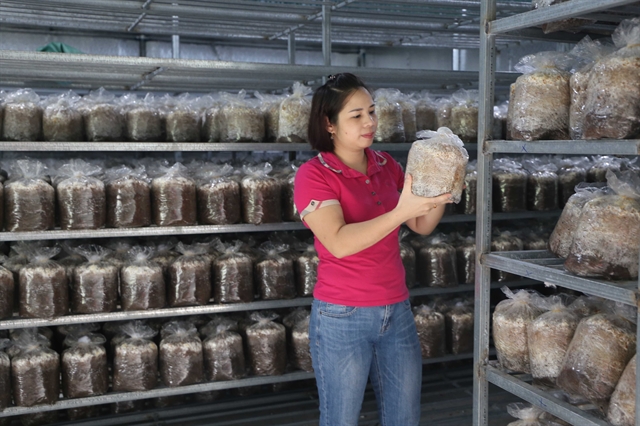 Society
Society


|
| A member of Hợp Giang Agricultural Cooperative inspects mushroom embryos.The co-operative is leading the way in mushroom production in Bắc Kan Province’s Bạch Thông District. — VNA/VNS Hoàng Giang |
HÀ NỘI — While positive results have been achieved getting people to work together as part of a co-operative, there’s still limitation in its development, said Võ Thành Thống, Deputy Minister of Planning and Investment.
He made the statement yesterday at a conference held to review 15 years of implementation of the Party Central Committee’s resolution on continuing to reform, develop and improve the effectiveness of the collective economy.
According to Thống, over the 15 years since Resolution 13 NQ/TW was issued at the fifth session of the ninth Party Central Committee in 2002, the number of co-operatives has increased considerably and their quality also improved as well.
2,520 cooperatives were set up in 2018, up 1,551 against the year 2013.
Cooperatives, particularly agricultural ones, focus on supporting household economies through providing services or jobs for members.
The scale, capital and operation of cooperatives have been expanded and many co-operatives have expanded across the commune and district.
A lot of co-operatives have committed leaders who apply science and technology into production.
“Hundreds of co-operative models have been established, bringing about economic benefits to cooperative members,” Thống said.
“These are encouraging signals, showing that the collective economy and cooperatives are recovering and developing in the right direction.”
The number of co-operatives who operate effectively accounted for 57 per cent agricultural ones and 50-83 per cent among non-agricultural since the Law on Co-operative took effect, said Nguyễn Văn Đoàn, general director of the Department of Co-operatives, under the Ministry of Planning and Investment.
He said the average turnover of a cooperative in 2018 reached nearly VNĐ4.5 billion (US$194,000) per year, about 5.2 times compared to that of 2003.
Average yearly income of a cooperative member also increased from VNĐ15.7 million in 2003 to VNĐ36.6 million, up 133 per cent.
While applauding positive results in the implementation of the economic model, Thống said the development of co-operatives hadn’t met its full potential.
Many still face challenges with poor facilities and backward technology. The capacity and skills of management staff in the co-operatives are limited, making it difficult to meet the demand of production in the market economy, he said.
Đoàn said the Ministry of Planning and Investment and the Việt Nam Co-operative Alliance would organise two events including 2019 Co-operative Forum to collect opinions of co-operatives and members on the current production, obstacles as well as experience in developing new models.
A conference would be also held to review 15 years of implementation of the Party Central Committee’s resolution on continuing to reform, develop and improve the effectiveness of the collective economy. It would focus on pinpoint obstacles to be removed and set forth solutions to be adopted in the coming time.
The two events will be organised on the same day (October 14). — VNS




